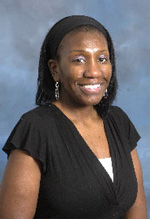Williams’ study backed by grant from the USC Institute for African American Research
February 24, 2009
An Arnold School doctoral student is turning her analytical eye toward an innovative cancer awareness program to see how well it is working and look at ways to strengthen the effort.

Michelle Williams
Michelle Williams is the recipient of a $1,000 grant from the USC Institute for African American Research to study the Shop Talk Movement.
Shop Talk, launched last September, trains African American barbers and stylists to talk to their clients about the importance of colon cancer screening and early detection.
Shop Talk is the brainchild of Gerald Footman and his wife Tia Brewer-Footman of Charleston. The Footmans operate FB Consulting Group, which publishes hair etc., an ethnic health and beauty magazine.
“Beauty salons and barbershops are ideal for the delivery of health messages because women and men visit them regularly, and they form trusting relationships with their barbers or stylists,” Williams said in her grant application.
According to the American Cancer Society, colorectal cancer is the third most common cancer among men and women and the second most common cause of U.S. cancer deaths.
About 150,000 new cases and 56,000 deaths occur annually in the nation, with approximately 2,400 new cases in South Carolina.
The cancer strikes hard in the African-American community, particularly among women, said Williams, a graduate student in the Department of Health, Promotion, Education, and Behavior.
Shop Talk and other colorectal screening programs have been embraced by the American Cancer Society, National Institutes of Health, USC Center for Colon Cancer Research; S.C. Cancer Alliance, BlueCross/Blue Shield and businessman and philanthropist David Pfeil of Dallas.
Williams says that notwithstanding the support for Shop Talk, “There is a major lack of research concerning the use of lay health workers to promote colorectal cancer screenings; hence this research project can potentially spark an interest in a deficient body of knowledge that is in critical need of attention.”
By providing an evaluation of the program’s strengths and weaknesses and assessing its effectiveness, the Shop Talk program could later be replicated and delivered in barbershops and beauty salons throughout the state and the nation, resulting in a substantial decline in CRC mortality rates” she said.
Other health interventions (i.e., breast cancer, diabetes, and hypertension) also could be patterned after the Shop Talk program, she said.
Williams said she has until the end of the summer to finish the study, prepare an executive summary and publish the results in a public health journal.
She is on track to finish her doctorate in the spring of 2011, a benchmark for a future career in teaching and research at the collegiate level.
Williams works as a graduate assistant for Dr. Heather Brandt who has a major influence on her advanced academic career. Brandt’s research interests include cancer prevention and control and cancer disparities among underserved populations.
Although she hails from Florida, Williams does not claim a hometown there. Her father was career military so that meant frequent family relocations.
Williams earned her bachelor’s and master’s degrees in public health from Florida A&M University in Tallahassee.
There she first learned about USC from Dr. Melva Thompson-Robinson, a faculty member and an Arnold School alumnus.
The Institute for African American Research was established last year to support research that enhances the scholarly study and public understanding of race and black life in South Carolina, the Southeast and beyond.



_01.jpg)
_02.jpg)